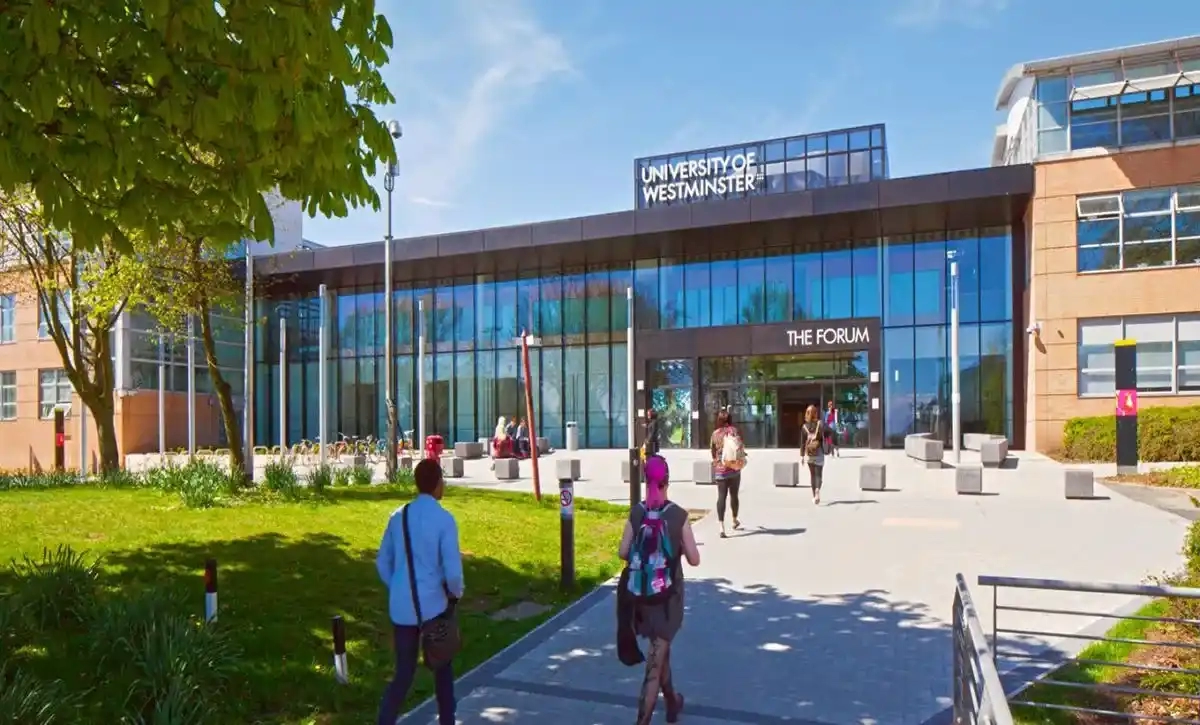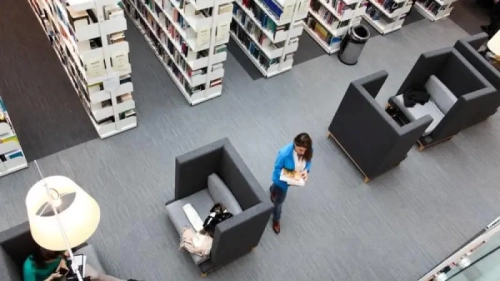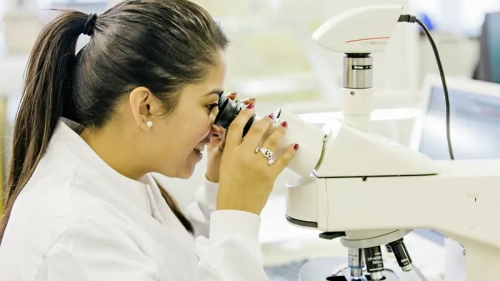The University of Westminster is a London-based institution established in 1838, initially as the first polytechnic in London. It boasts four campuses, with three located in central London. The university is known for its diverse student body, welcoming over 19,000 students from more than 160 countries.
| Acronym | UW |
| Nickname | UW |
| Motto / Slogan | The Lord is our Strength |
| Colour | Royal blue, Fuchsia |
| Mascot | Westminster Griffin |
| Founded | 1838 |
| Undergraduate Programmes | |
| Postgraduate Programmes | 128 |
| Location | City of London, England, United Kingdom |
| Address | University of Westminster 309 Regent Street London W1B 2HW |
The University of Westminster's mission is to help students and colleagues from diverse backgrounds fulfill their potential and contribute to a more sustainable, equitable, and healthier society.
The University of Westminster's vision is: "A place where discoveries are made, barriers are broken, diversity is celebrated, and where everyone is welcome."

The University of Westminster's primary objective is to empower students to reach their full potential through practical, career-focused education.
As a student at the University of Westminster, you will have the whole of London right on your doorstep.
Located in the heart of one of the world’s most vibrant and diverse cities, the University offers endless opportunities for learning, networking, and cultural exploration.
The University of Westminster is globally recognised for its international focus and diverse community.
Ranked 4th in the UK and 32nd in the world for “International Outlook” by the Times Higher Education Young University Rankings (2020), Westminster offers a truly global learning environment. Students from over 160 countries come together to share ideas, perspectives, and experiences—preparing you for a career that crosses borders.
Our strong industry connections open doors to real-world experience.
At the University of Westminster, our close links with industry and professional organizations allow you to work with and learn directly from leading employers across a wide range of sectors.
Our entry requirements vary by course, so please refer to the individual course pages for the specific grades required to study with us. For international students, please first check the 'Entry Requirements' tab on the course page. If your qualifications are not listed, please visit our country pages or contact our Course Enquiries team at [email protected]. If you do not meet the normal requirements of the programme, please contact course enquiries, as we may still be able to consider your application.
Specific entry requirements for each course are provided on our course pages. You can access our course pages via our course search or subjects page.
For international students, please first check the entry requirements tab on the course page, if your qualifications are not listed please check our country pages or contact our course enquiries team at [email protected].
If we suspect that your reference(s) aren't genuine, or have not been submitted by the registered referee, we will take reasonable steps – including contacting third parties – to determine their authenticity. If the reference(s) turn out not to be genuine, your application will be withdrawn and will not be considered by the academic department.
If your qualification is not listed, you may still be able to apply for our courses. Contact our course enquiries team to discuss your qualifications.
UNDERGRADUATE
Applying for one of our undergraduate courses is simple – just click on the red 'Apply' button at the top of our course pages. You will be directed to the UCAS website (Universities and Colleges Admissions Service) to make your application. Everyone applying for a full-time degree must apply through UCAS - this includes international students. On the UCAS website, you will fill in a UCAS application form and choose a maximum of five courses and five universities. You can save your UCAS application at any point and return to it later. Universities will not be able to see where else you've applied until after they've made you an offer.
Full details on completing your application are provided on the UCAS website.
Remember, every university you apply to will receive the same personal statement, so don't mention any institutions by name.
If the courses you're applying to are in different subject areas, avoid mentioning them by name. Instead, talk about your general skills and motivations, such as problem solving or creativity. In addition to your academic studies, you can also include extracurricular activities, such as hobbies and interests, internships, voluntary work, part-time work, sports, etc.
POSTGRADUATE
You can now apply directly to us, via our new applications service. Just click on the red Apply button on our course pages and you'll be directed to complete your application. If you've already submitted an application through UCAS Postgraduate, it will be processed as normal – you do not need to take any action. There are some courses which have alternative application routes – please look at our course pages for up-to-date information.
Make sure you've got the relevant documents ready before you apply. Exactly what you'll need depends on the course, but generally, you should have the following:
Email: [email protected]
Phone : +44(0)2079115000




2. Members of the general public can get access to our gyms and classes, as well as our range of other sports and fitness facilities and activities, without the astronomical joining fees and attitude you can find at other city-central gyms.
3. The University of Westminster’s Student Accommodation Team can help you with a variety of housing issues. As well as providing University halls of residence, the team can assist you in your search for alternative accommodation. They also offer advice about issues such as tenancy agreements and dealing with landlords.
4. Research at Westminster furthers our University’s historic mission to enable people from every background to reach their full potential. At Westminster, researchers ask the questions that expand beyond existing boundaries. Continuing our pioneering past, colleagues and students, thinkers and creators, all come together in our Research Communities, Groups and Centres to look forward, anticipate what’s changing, and embrace the new with energy and imagination.
BCS, BPS, CIOB, CABE, ICE, RICS, and HPC.
My work provides me with the opportunity to stimulate and facilitate widespread engagement in teaching, research, enterprise, business support and knowledge exchange activities as well as seeking out and developing innovative ideas, superior quality and progressive practice to enhance the University’s capability.
I work closely with the University Executive Board, to ensure we are providing a first-class education for our students, and that we continue to build strong relationships with industry through our enterprise and research, making a difference to many professions in the UK and globally.
In this capacity, he provides leadership to a learning community of some 7000 students and 300 academics, which is both globally oriented but also embedded in London, one of the most vibrant and diverse modern metropoles. Our focus at Westminster Business School is to provide an outstanding student experience that leads to positive outcomes for our graduates, impactful research, and knowledge exchange. A key enabler in achieving this is a collegiate culture and an environment that empowers their talented colleagues to innovate.
In her last role, she was Pro-Vice-Chancellor for Education and Student Experience at the University of Hertfordshire. She has worked in education for almost my whole professional life: in early years, primary, further, adult, and higher education. Before working at Hertfordshire, she was a senior leader in a primary school.
She is passionate about working with people from all backgrounds to enable them to grow and achieve in ways that are valuable to them, and which enable them to add value to the lives of others.
As Deputy Vice-Chancellor, Research and Knowledge Exchange, his role is to ensure that our whole community is focused on this vision. Westminster is already home to some of the most talented researchers and research teams in the world, and his work will ensure that we continue to develop innovative partnerships and resources, extending the impact we create and the difference we make in the world. He has particular care for our postgraduate researchers, the new generation of knowledge innovators, and as such works closely with our Graduate School to ensure that Westminster continues to be a great place to carry out PhD research.
The Westminster story began in 1838 when Sir George Cayley opened the Polytechnic Institution at 309 Regent Street in London. In 1881, philanthropist Quintin Hogg bought the Royal Polytechnic Institution building and moved his Young Men’s Christian Institute into 309 Regent Street, which soon became the publicly funded Regent Street Polytechnic.
Since then, our educational institution has secured a rep... read more